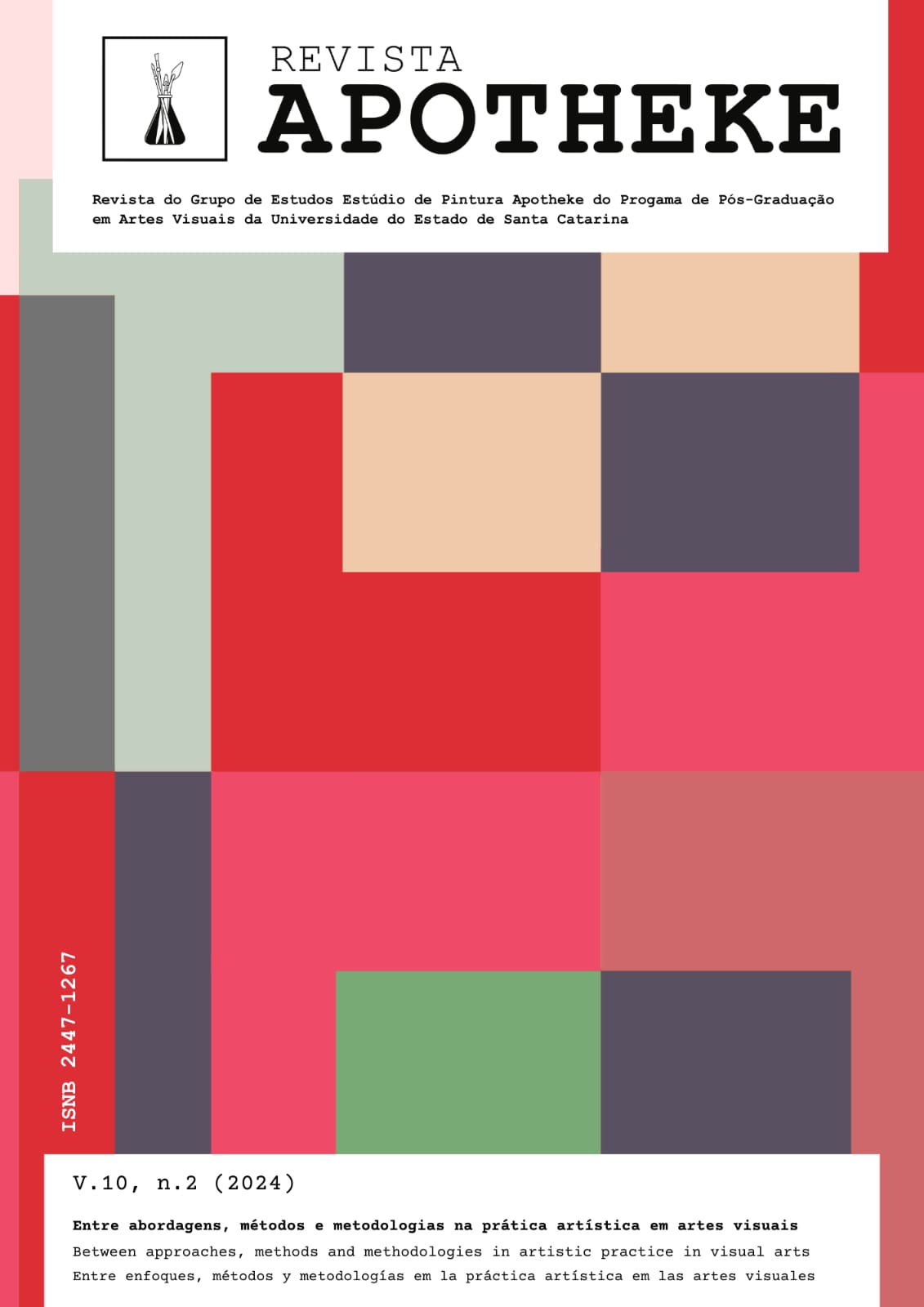A prática no ensino da arte em contextos escolares: questões iniciais para um debate cada vez mais necessário
DOI:
https://doi.org/10.5965/244712671022024230Palavras-chave:
arte, educação, ensino da arte, formação docente, práticaResumo
O texto apresenta os resultados iniciais de um exercício de desmontagem das relações entre arte, educação e formação docente em artes visuais. Essa atitude metodológica toma como princípio as abordagens investigativas denominadas de pós-críticas. Ao trabalhar no desencaixe dos saberes que constituem o ensino da arte no contexto da educação básica, me deparei com um tema que tem sido deixado de lado em nossas discussões: a prática. Sem o intuito de querer apontar um caminho a ser seguido, me interessa apresentar os questionamentos que vêm sendo construído sobre o tema, ao mesmo tempo em que aponto as vias que podem nos oferecer pistas para recuperar uma possível dimensão poética para a docência em arte na escola, menos técnica e mais inventiva, menos instrumentalizadora e mais aberta à experimentação. Ao final do texto, são apresentadas questões que buscam ampliar esse debate interessado em compreender o lugar da prática no ensino da arte.
Downloads
Referências
BARBIERI, Stela. Territórios da invenção: ateliê em movimento. São Paulo: Jujuba, 2021.
BRASIL, Parecer 570, de 10 de fevereiro de 1977, do Conselho Federal de Educação. Sobre o tratamento a ser dado aos componentes curriculares previstos no artigo 7º da Lei 5.692/1971. Rio de Janeiro. Disponível em: https://periodicos.fgv.br/fe/article/view/87401/82214 . Acesso em: 01 de março de 2024
BRASIL, Lei 12.287, de 13 de julho de 2010. Altera a Lei no 9.394, de 20 de dezembro de 1996, que estabelece as diretrizes e bases da educação nacional, no tocante ao ensino da arte. Brasília: Presidência da República, 2010. Disponível: https://www.planalto.gov.br/ccivil_03/_ato2007-2010/2010/lei/l12287.htm Acesso em: 28 de fevereiro de 2024.
BRASIL, Resolução nº 510, de 07 de abril de 2016. Normas aplicáveis a pesquisas em Ciências Humanas e Sociais. Disponível em: https://conselho.saude.gov.br/images/comissoes/conep/documentos/NORMAS-RESOLUCOES/Resoluo_n_510_-_2016_-_Cincias_Humanas_e_Sociais.pdf . Acesso em: 15 de fevereiro de 2024 .
BRASIL, Lei nº 13.415, de 16 de fevereiro de 2017. Altera as Leis n º 9.394, de 20 de dezembro de 1996, que estabelece as diretrizes e bases da educação nacional, e 11.494, de 20 de junho 2007, que regulamenta o Fundo de Manutenção e Desenvolvimento da Educação Básica e de Valorização dos Profissionais da Educação, a Consolidação das Leis do Trabalho - CLT, aprovada pelo Decreto-Lei nº 5.452, de 1º de maio de 1943, e o Decreto-Lei nº 236, de 28 de fevereiro de 1967; revoga a Lei nº 11.161, de 5 de agosto de 2005; e institui a Política de Fomento à Implementação de Escolas de Ensino Médio em Tempo Integral. Brasília: Presidência da República, 2017. Disponível em: https://www.planalto.gov.br/ccivil_03/_ato2015-2018/2017/lei/l13415.htm . Acesso em: 01 de março de 2024
BRASIL, Projeto de Lei 5983/2023. Altera a Lei 9.394, de 20 de dezembro de 1996, para dispor sobre o ensino de arte no âmbito da educação básica. Disponível em: https://www.camara.leg.br/proposicoesWeb/fichadetramitacao?idProposicao=2412556 . Acesso em: 01 de março de 2024
DE DUVE, Thierry. Cinco reflexões sobre o julgamento estético, Revista Porto Arte, Porto Alegre, v. 16, n. 27, p. 43-65, nov. 2009.
GARCIA, Maria Manuela Alves. Políticas curriculares e profissionalização: saberes da prática na formação inicial de professores. Educação em Revista, v. 32, p. 131-155, 2016.
NÖRNBERG, Marta. Políticas conservadoras e (dês)intelectualização da docência. Práxis Educativa, v. 15, p. 1-14, 2020.
SILVA, Tomaz Tadeu. Documentos de identidade: uma introdução às teorias do currículo. 3 ed. Belo Horizonte: Autêntica, 2019.
LOPONTE, Luciana Gruppelli. Artes visuais como plataforma para pensar e viver: outros espaços para a docência. In: Sílvia Nogueira Chaves; Maria dos Remédios de Brito. (Org.). Formação, ciência e arte: autobiografia, arte e ciência na docência. 1 ed. São Paulo: Livraria de Física, 2016, p. 71-88.
MONCLÚS, Glória Jové. Maestras contemporáneas. Lleida: Ediciond de la Universitat de Lleida, 2017.
Downloads
Publicado
Como Citar
Edição
Seção
Licença
Copyright (c) 2024 Daniel Bruno Momoli

Este trabalho está licenciado sob uma licença Creative Commons Attribution-NonCommercial 4.0 International License.
Os autores de trabalhos submetidos à Revista APOTHEKE autorizam sua publicação em meio físico e eletrônico, unicamente para fins acadêmicos, podendo ser reproduzidos desde que citada a fonte. Os mesmos, atestam sua originalidade, autoria e ineditismo.
Os artigos publicados pela revista são de uso gratuito, destinados a aplicações
acadêmicas e não comerciais. Os direitos autorais são todos cedidos à revista. Os artigos cujos autores são identificados representam a expressão do ponto de vista de seus autores e não a posição oficial da Revista Apotheke. O(s) autor(es) se compromete(m) a sempre que publicar material referente ao artigo publicado na Revista Apotheke mencionar a referida publicação da seguinte forma:
"Este artigo foi publicado originalmente pela revista Apotheke em seu volume (colocar o volume), número (colocar o número) no ano de (colocar o ano) e pode ser acessado em: http://www.revistas.udesc.br/index.php/APOTHEKE/index"
É responsabilidade dos autores a obtenção da permissão por escrito para usar em seus artigos materiais protegidos pela Lei de Direitos Autorais. A revista Apotheke não é responsável por quebras de direitos autorais feitas por seus colaboradores.
Os autores mantêm os direitos autorais e concedem à revista o direito de primeira publicação, com o trabalho licenciado sob Licença Creative Commons do tipo atribuição BY-NC:
Atribuição (BY): os licenciados têm o direito de copiar, distribuir, exibir e executar a obra e fazer trabalhos derivados dela, conquanto que deem créditos devidos ao autor ou licenciador, na maneira especificada por estes.
Uso Não comercial (NC): os licenciados podem copiar, distribuir, exibir e executar a obra e fazer trabalhos derivados dela, desde que sejam para fins não comerciais.
Após a publicação dos artigos, os autores permanecem com os direitos autorais e de republicação do texto.




